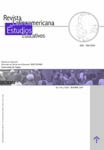Authors
Abstract
In educative terms, the present discussions on aspects like pedagogy, education, learning, formation and curriculum, have made possible new forms to see and to understand the educative reality. These reflections are fundamental for teachers, since they allow us to better plan education in order to take our children and young people to an education with meaning that really responds to the needs of the context and to satisfy their particular interests and motivations. From its origin with the Anglo-Saxon paradigm, the curriculum has become one of the most widely discussed aspects in educative terms, given its different conceptions, characteristics, functions and possibilities, in many cases leading to an ignorance of the true role of this component; for such reason, this article insists on the curricular component, given its importance and transcendence on human formation, as well as on the difficulties that are currently present in their constitution, consolidation and social relevance process. In the first part, the article will reference the concept of curriculum from diverse positions, as well as trying to approach its characteristics, possibilities, its being and its ideal state, as well as some problems. In a second moment, the article deals with curricular transversality, its importance and possibilities, to end the text with environmental education as a transversal topic and to propose some options that will highlight this aspect within all curricular structures.
References
Decreto 1743 de 1994.
Fernández Batanero, José María. (2000). “Una escuela para todos desde la transversalidad: los contenidos transversales”. En: Miñambres A. y Jové G. . Universidad de Lleida.
________. (2003). “La transversalidad curricular en el contexto universitario: un puente entre el aprendizaje académico y el natural”. Universidad de Sevilla. Revista Facultad Ciencias de la Educación. Sevilla.
Ley 115 de 1994. Ley General de Educación. Santafé de Bogotá.
López Jiménez, Nelson. (2001). La deconstrucción curricular. Colección Seminarium Magisterio. Cooperativa Editorial Magisterio.
Monclus, Antonio y Sabán, Carmen. (1999). Educación para la paz. Madrid: GRAO.
Moreno Casteñeda, Manuel. (2004). “Valores transversales en el currículum”. Revista de Educación y Cultura de la Sección 47 del SNTE-La Tarea. Universidad de Guadalajara.
Política Nacional de Educación Ambiental. (2003). Ministerios de Educación Nacional y Ambiente, Vivienda y Desarrollo Territorial. Santafé de Bogotá.
Posner, George J. (1985). Análisis de Currículo. Segunda Edición. Santafé de Bogotá: Mc Graw Hill.
Reyzabal, María Victoria y Sanz, Ana Isabel. (1999). Los ejes transversales. Aprendizajes para la vida. Madrid: Editorial Escuela Española.
Stenhouse, Lawrence. (1985). Investigación y desarrollo del currículum. Madrid: Morata.
Zúñiga Chávez, María Eugenia. (1998). La educación ambiental: una dimensión imprescindible del currículum en el marco del “Nuevo Orden Mundial”. En: IX Congreso Internacional sobre Tecnología y Educación a Distancia. Costa Rica.

 PDF (Español)
PDF (Español)
 FLIP
FLIP



















